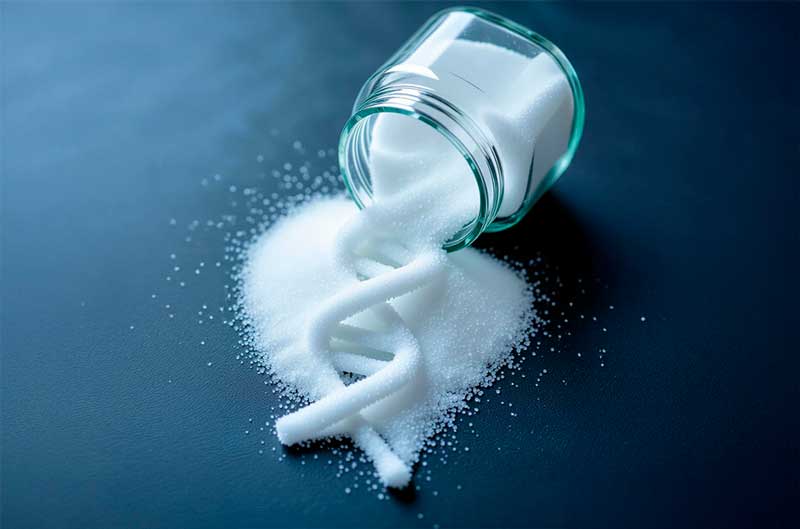
2025/09/15
Gene change in sugar digestion alters bowel symptoms and glucose levels in IBS patients
An international study, published in Gut, shows that a common DNA change is associated with gut symptoms and lower glucose levels after sugar ingestion in individuals with irritable bowel syndrome (IBS).
The finding suggests that adding genetic testing to current diagnostic tools may enable more personalized dietary and therapeutic strategies for the 5–10% of the population who suffer from IBS.
IBS affects an estimated 5–10% of the population and is characterized by abdominal pain, bloating, diarrhoea and constipation. Its causes remain incompletely understood, and treatments are often of limited efficacy. The novel study reinforces the role of genetics of carbohydrate digestion in IBS and opens avenues for novel diagnostic and management approaches.
Researchers from Spain, Italy, Germany and Sweden now report that carriers of a common sucrase-isomaltase gene variant (Val15Phe, present in about one in three Europeans), display altered blood glucose responses and a tendency to experience more bowel symptoms after the ingestion of sucrose (table sugar). The findings suggest that genetic testing could help identify IBS patients with underlying carbohydrate maldigestion, paving the way for more tailored dietary recommendations.
Sucrase-isomaltase (SI) is a key intestinal enzyme for the breakdown of sucrose into glucose and fructose. Inactive (mutated) forms of the SI gene cause congenital sucrase-isomaltase deficiency (CSID), a rare disorder of sugar maldigestion, but recent studies indicate that milder SI dysfunction also increase the risk and severity of IBS and influence responses to carbohydrate-reduced diets. While most defective forms of SI are rare, Val15Phe is surprisingly common in European populations and reduces enzyme activity by about 35%.
In the new study, 33 IBS patients underwent a standard sucrose challenge test, with symptoms and blood glucose levels measured for two hours after sugar intake. While carriers of Val15Phe did not differ from non-carriers at the start, they showed blunted blood glucose increases (because of reduced SI activity) and tended to report more bowel discomfort after sucrose ingestion.
“These preliminary results suggest that simple challenge tests combined with SI genetic profiling, could help flag patients with hidden defects in carbohydrate digestion,” highlights senior author Mauro D’Amato, Professor of Medical Genetics at LUM University and Ikerbasque Research Professor at CIC bioGUNE, member of BRTA. “This may provide a less invasive alternative to current diagnostic approaches and inform dietary advice or therapeutic strategies for individuals with IBS.”
These results suggest that Val15Phe may also shape post-meal blood sugar responses, highlighting its potential importance for metabolic health and conditions such as diabetes, the authors concluded.
The research was led by Mauro D’Amato’s Gastrointestinal Genetics Research Group and involved investigators from CIC bioGUNE (Spain), LUM University (Italy), University of Naples Federico II (Italy), Kiel University (Germany) and Lund University (Sweden). Funding was provided by the Spanish Government MCIN/AEI (PCI2021-122064-2A), the German Federal Ministry for Education and Research BMBF (01EA2208A), the European Joint Programming Initiative “A Healthy Diet for a Healthy Life” (JPI HDHL), and the Development Foundation of Region Skåne.
Photograph by: © Figure created by AI using Grok.
Reference: Zamfir-Taranu A, Löscher B-S, Franke A, Bonfiglio F, Ohlsson B, D’Amato M. The sucrase-isomaltase hypomorphic variant Val15Phe affects the response to a sucrose challenge test in IBS patients. Gut. DOI: 10.1136/gutjnl-2025-336393.
About CIC bioGUNE
The Centre for Cooperative Research in Biosciences (CIC bioGUNE), member of the Basque Research & Technology Alliance (BRTA), located in the Bizkaia Technology Park, is a biomedical research organisation conducting cutting-edge research at the interface between structural, molecular and cell biology, with a particular focus on generating knowledge on the molecular bases of disease, for use in the development of new diagnostic methods and advanced therapies.
About Ikerbasque
Ikerbasque - Basque Foundation for Science - is the result of an initiative of the Department of Education of the Basque Government that aims to reinforce the commitment to scientific research by attracting, recovering and consolidating excellent researchers from all over the world. Currently, it is a consolidated organization that has 290 researchers/s, who develop their work in all fields of knowledge.
About BRTA
BRTA is an alliance of 4 collaborative research centres (CIC bioGUNE, CIC nanoGUNE, CIC biomaGUNE y CIC energiGUNE) and 13 technology centres (Azterlan, Azti, Ceit, Cidetec, Gaiker, Ideko, Ikerlan, Leartiker, Lortek, Neiker, Tecnalia, Tekniker y Vicomtech) with the main objective of developing advanced technological solutions for the Basque corporate fabric.
With the support of the Basque Government, the SPRI Group and the Provincial Councils of the three territories, the alliance seeks to promote collaboration between the research centres, strengthen the conditions to generate and transfer knowledge to companies, contributing to their competitiveness and outspreading the Basque scientific-technological capacity abroad.

See a large version of the first picture





